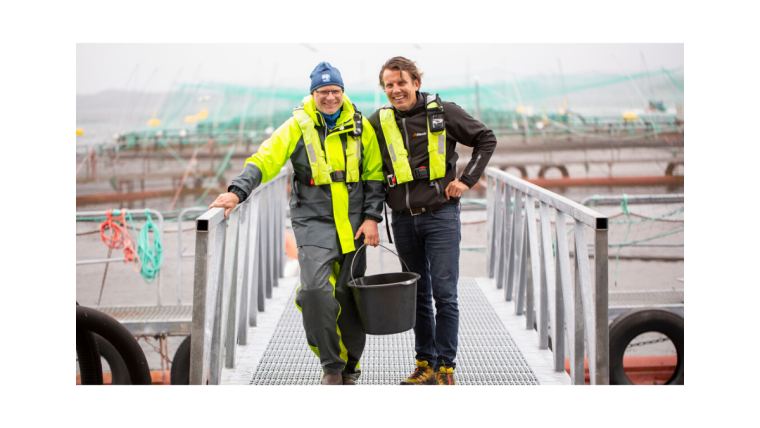Alltech announces R&D collaborations into sustainable salmon production for Norway fisheries

Jan Ivar Bildøy, Blom Fiskeoppdrett pictured with Oystein Larsen, aqua division manager, Alltech Norway at one of the six salmon farms participating in Alltech and Nofima research into sustainable salmon production.
EINVU project sees Alltech collaborate with leading institute for applied research, Nofima
[BERGEN, Norway] – Developing more robust and sustainable salmon through nutritional product innovations and associated scientific documentation is the aim of Alltech’s latest aquaculture collaboration. Global nutrition company, Alltech has teamed up with leading fisheries, and the institute for applied research, Nofima, on six research licences for salmon farms Blom Fiskeoppdrett, SalmoNor and Salten FoU. As part of this series of large-scale experiments; industrial production, organic minerals and heterotrophic microalgae will be tested.
The project has been named EINVU, a Norwegian acronym that stands for “Nutritional Innovations” — the key to solving major welfare challenges. Over the next three years, trials will be conducted on each farm responsible for operating the licenses. Alltech will supply products for testing, as well as overseeing the management of the projects. Nofima will be responsible for trial design, analysis, interpretation of data and reporting.
“In the project, we want to investigate whether we can achieve positive performance results, similar to what we have seen in small scale trials. It will be very exciting because that’s where fish really get challenged,” said Elin Kvamme, project manager at Alltech.
Farms have been chosen to represent three different parts of Norway, all with different operational challenges. During the trial period, the effect of various levels of organic trace minerals and microalgae will be sampled and tested to monitor progress. From small-scale to commercial production, many factors like operational management and environmental conditions can cause stress for salmon. For example, if temperature fluctuations, oxygen and sea lice infestation occur concurrently, the salmon can become weak, leading to disease and, in some cases, increased mortality.
“In small scale experiments with organic minerals, we see that the mineral deposit in the fish is higher and the fish can better withstand stress,” explained Ms. Kvamme. “Growth is also better; we see a lower mortality rate and reduced gaping. When it comes to the use of microalgae in the feed, we have seen increased growth, better pigmentation and improved EPA + DHA levels.
“The future supply of fish oil is uncertain, and alternatives must be sourced. Heterotrophic microalgae have high levels of omega-3, and it is, therefore, appropriate to study the effects of replacing marine raw materials with this sustainable source.”
In 2012, Alltech entered into a strategic collaboration with Nofima to document the effects Alltech products and solutions have on salmon. “We are very pleased that Nofima, a respected research organisation, has partnered with us on this journey. All products have been carefully tested and published in reputable journals,” added Mr. Kvamme.
For more information click here.















